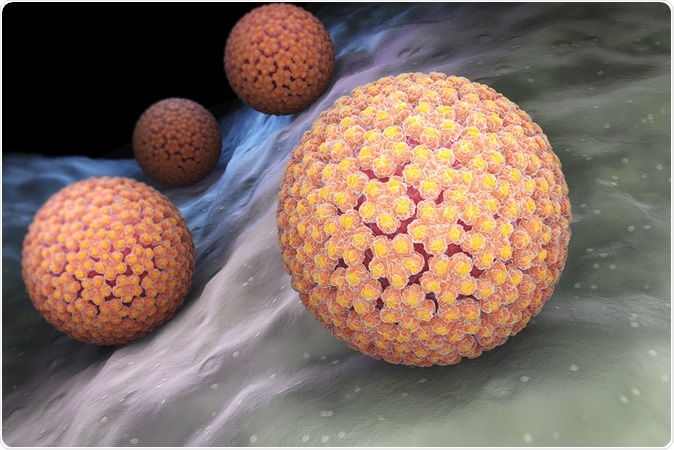The UK government has announced that boys in England aged 12 to 13 years are to be vaccinated against human papillomavirus, or HPV. This injection would protect them against HPV infection. HPV infection has been linked to cervical cancer in women and oral, penile, throat and anal cancer among men.

Human papillomavirus (HPV) is a DNA virus from the papillomavirus family. 3D illustration. Image Credit: Tatiana Shepeleva / Shutterstock
According to the announcement all boys aged 12 to 13 years would be administered with the vaccine. Beginning 2019, thousands of boys of this age are expected to receive the vaccination annually said the announcement. Girls of the same age are already being routinely vaccinated against HPV. Scotland and Wales and several other countries offer this vaccine to both genders.
If all girls are vaccinated against HPV the risk of transmission of the infection reduces. HPV prevention is the mainstay of cervical cancer prevention in women. If all the boys are also vaccinated there would be “herd immunity” explain experts that would protect a large population of boys and girls from this infection. Routine HPV vaccination has reduced the incidence of cervical cancer in several countries.
Mary Ramsay, head of immunizations at Public Health England, in a statement said, “This extended program offers us the opportunity to make HPV-related diseases a thing of the past and build on the success of the girls' program, which has already reduced the prevalence of HPV 16 and 18, the main cancer-causing types, by over 80%.” “We can now be even more confident that we will reduce cervical and other cancers in both men and women in the future,” she said.
Human papilloma virus or HPV is a group of 150 related viruses that are usually transmitted via sexual contact such as kissing or sexual intercourse. The infection in most cases is mild and body may fight it on its own. Certain individuals however may develop genital warts and later cancers of the genitalia as a result of this infection.
The US Centers for Disease Control and Prevention states that “almost every person who is sexually active will get HPV at some time in their life if they don't get the HPV vaccine.” All individuals need to be vaccinated before they have been exposed to the virus. The vaccine can be 100 percent effective in preventing infections. In England between 2010 and 2016, the rates of HPV strains 16 and 18 infection among women aged 16 and 21 years has fallen by 86 percent due to routine vaccination says the Public Health England.
Shirley Cramer CBE, Chief Executive, Royal Society for Public Health in a statement said, “It is imperative that the gender-neutral programme is implemented by September 2019 to ensure as many people as possible reap the benefits.”